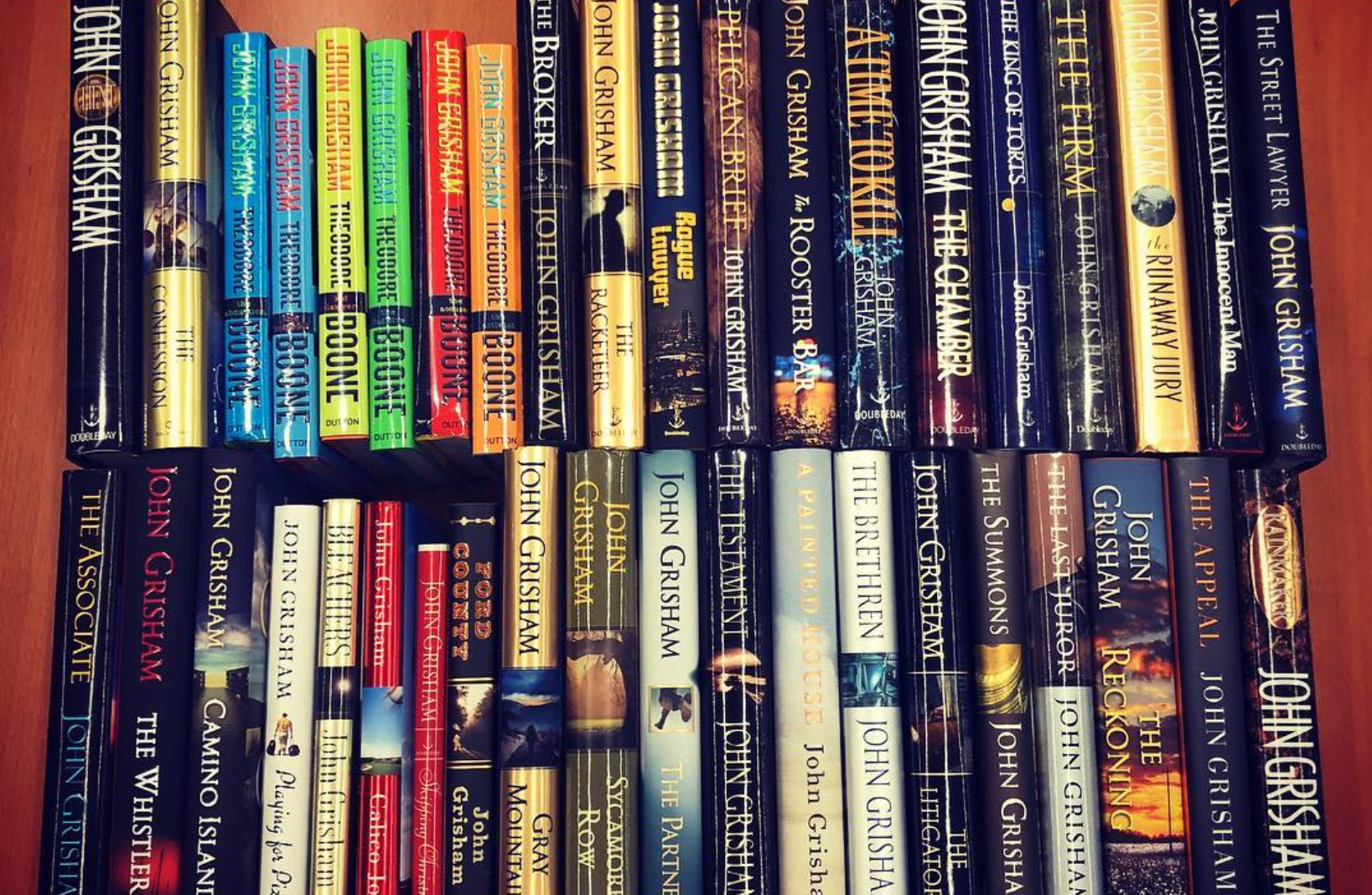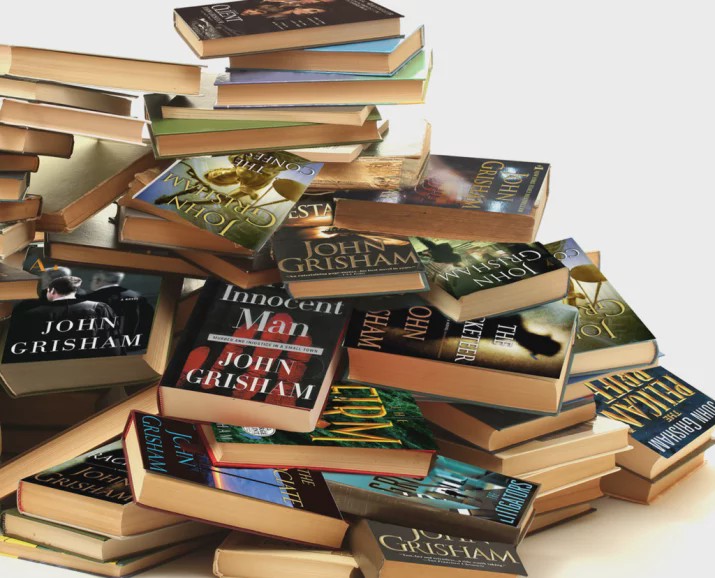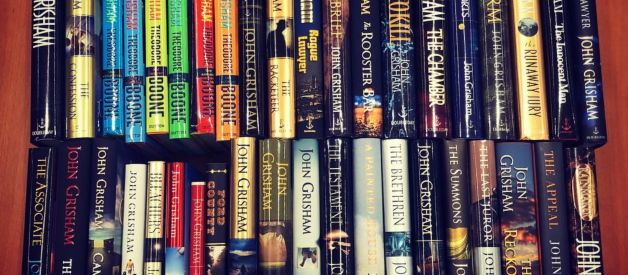 photo via John Grisham?s Instagram
photo via John Grisham?s Instagram
Note: This has been updated since its initial publication in 2013 to include the latest releases and some of the order has been changed since then as well.
Excluding the Theodore Boone series for children and a few Kindle singles, John Grisham has released thirty-six books ? thirty-four novels, one collection of short stories and one work of non-fiction. Since I have loved his work (to varying degrees) for years ? flaws and all ? I decided to rank them.
36
Skipping Christmas (2001) ? 2001 was the first time Grisham branched out and wrote something other than legal fiction. He published two books without any lawyers that year. The second, Skipping Christmas, is under 200 pages and still tortuous to finish. It begins with a unique premise ? fed-up with the commercialization of Christmas, a couple decides to skip the holiday ? but the attempts at humor are stale and the ending is overly sentimental.
35
The Litigators (2011) ? The knock on Grisham is that he writes cardboard characters with little or no shades of grey to their personalities ? someone is either good or bad. While I would normally argue against that point, it is entirely appropriate for The Litigators, which pounds home a message while also trying (and failing) to be funny. Also, like many of his later novels, it recycles elements from previous works (in this case The Rainmaker, The Testament, and especially The Street Lawyer).
Get the Most Out of Your Books ? Be an Active Reader
Keeping your library pristine will prevent you from getting the most out of it
medium.com
34
The Confession (2010) ? Much of Grisham?s inspiration comes from actual events and The Confession feels like a true news account. Didactic and joyless, it takes on the problem of wrongful convictions ? and the death penalty ? but it is at once plodding and implausible, with caricatures more than characters, painfully long, drawn-out scenes, and an ending that is both predictable and unsatisfying.
33
Gray Mountain (2014) ? Another criticism of Grisham is that he has never written women well. In Gray Mountain, the main character was a female and it did not go well. The book is overly preachy regarding the strip mining in West Virginia, but the biggest problem is that the story?s protagonist is both nave and unlikable.
32
The Whistler (2016) ? The tale of a member of the Board on Judicial Conduct investigating a corrupt judge, The Whistler plods along without any climax or suspense, explaining the story in a basic ? and boring ? manner before it sputters to an end.
31
The Appeal (2008) ? The start of a stretch in which Grisham really began railing against social injustices, it led to the dullest era of his career, resulting in four novels near in the bottom of this list. Almost comical in its David versus Goliath battle between a small-town husband and wife legal team and a billionaire corporate executive (with commentary against political campaigning thrown into the mix), The Appeal is too focused on issues to be enjoyable.
30
Camino Winds (2020) ? Nearly everything that made Camino Island such an enjoyable read is missing from its sequel. The first time, Grisham introduced a new group of literary characters while performing a deep dive into the world of books and writing. The second visit to the island is not nearly as enjoyable. It feels like one thin book with a second, thinner one wrapped around it and the supporting star of the first novel becomes the main character here and, in the process, becomes more predictable and less entertaining. The other returning characters appear in cameo-level roles and the story could?ve taken place anywhere ? all in the service of solving a mystery with no stakes.
29
The Associate (2009) ? There are parts of The Associate, particularly in the first half of the book, that hearken back to The Firm, but it is a much less enjoyable read. The protagonist is fairly unlikable, the book?s climax is a dud, and the book doesn?t end so much as it just kind of stops.

28
Rogue Lawyer (2015) ? As his career progressed, Grisham began playing around with style and format, deviating from the formula of his early works. This is the biggest departure, as he does things he hadn?t done before, like writing short chapters (some very short) and creating a book of multiple parts that don?t intersect as much as they slightly overlap and are strung together. Rogue Lawyer is Grisham channeling Michael Connelly?s Mickey Haller, with a street lawyer whose office is his automobile and one that only plays dirty when the other side does. But when it comes to the street, Grisham is no Connelly and this comes off as generic and rote ? even the setting is an unspecific city.
27
The Broker (2005) ? Grisham threw a dart at a map for the locale of his next novel and the dart landed on Italy. Although it includes much of the maneuvering and intrigue of his best works, much of The Broker feels like a travel guide of Bologna, complete with long descriptions of meals and landmarks and a romantic subplot that goes nowhere.
26
Playing for Pizza (2007) ? After the work of penning his only non-fiction work, Grisham quickly went to work on something light and easy that had nothing to do with the law or death. Playing for Pizza follows an underachieving NFL quarterback to Parma, Italy, where he rediscovers his love for the game and learns something about himself in the process ? and it?s based upon actual people Grisham met while researching The Broker. It?s a fluff book, but more enjoyable than some of his more moralizing ones.
25
The Summons (2002) ? Considering he splits time living between Mississippi and Charlottesville, one would think that a novel that is set in those places would be great. It?s not. The weakest Grisham book that takes place in Clanton, The Summons tries to be a suspenseful whodunit but winds up just following the main character as he drives around with a bunch of money in his trunk. The only thing that saves it from being even worse is the welcome appearance of two of the best supporting characters in the Grisham catalog: Patton French and Harry Rex Vonner.
24
The Chamber (1994) ? An author that outlines each chapter before writing, Grisham has admitted that he did not do so for The Chamber and it?s obvious. His first real stumble after becoming famous, it has one of the strongest openings of a Grisham novel (and that?s actually impressive because he has many), but it is a long, meandering work that plods over the last hundred pages, dragging out the inevitable ending. Plus, Adam Hall?s extremely nave idealism becomes grating over 500 pages.
23
Calico Joe (2012) ? Nearly all of Grisham?s non-legal works involve sports and most of them also deal with a mixture of nostalgia, regret, and, ultimately, forgiveness. Calico Joe is no different. Told in a series of flashbacks, it is the story of the son of a middling Major League pitcher who reveres another player instead of his father and the idea that one instant can change a life. Heartwarming and sad at the same time, it falls short of what it could be, but still has more emotion than most of his books.
22
The Rooster Bar (2017) ? Grisham pulls much of his material from real life and, after reading ?The Law-School Scam? in an issue of The Atlantic, another novel was born. The story of some friends about to graduate from a for-profit law school with no job prospects and predatory loan sharks circling, it has a unique hook and parts of it ? particularly the ending ? are really strong. The characters? actions invoke memories of previous works by the author, hustling clients like in The Litigators or a reluctant attorney trolling for cases in a hospital cafeteria like The Rainmaker. It?s a fun ride, with the sermonizing kept in the background. Yet it does have flaws. Grisham still has trouble writing realistic female characters that aren?t either nave idealists or heartless tacticians and the book includes some of the weakest dialogue of his oeuvre, expository and awkward to the point of being painful.
21
The Client (1993) ? It?s amazing how successful The Client was considering how ridiculous it is. It?s like MadLibs for popular fiction: there?s a dead senator, the mafia, a power-hungry district attorney, a savvy female lawyer with a pure heart, and an 11 year-old from a trailer park that is smarter than everyone else in the book. The whole thing is contrived and the ending is predictable. Still, this was early Grisham when he could make the cleaning of a bathroom a page-turner and the book flies along, never worrying about how plausible it all is.
20
The King of Torts (2003) ? Another Grisham sermon, this time on the dangers of excess and greed, The King of Torts takes the old trope of a struggling lawyer and endows him with instant riches only to watch him waste it in pursuit of more. Parts of it are very strong, but other parts are not, resulting in a good, but not great effort.
19
The Reckoning (2018) ? There is a southern classic lurking within The Reckoning that Grisham can?t quite excavate. It begins with a murder in 1946 Mississippi, ends in 1950 New Orleans, and spends too much of the middle devoted to the Pacific theater in World War II. The tale is pretty great, one that slowly unravels with a surprise ending, but Grisham?s lack of finesse is ultimately what holds it back. The dialogue is painfully stilted, with people repeating each other?s names multiple times per page, but the most egregious piece is how he tries to evoke deep emotion not through character, but by having nearly everyone cry numerous times throughout the novel. Those flaws prevent it from being one of his best.
18
Bleachers (2003) ? The first Grisham book dealing with sports, Bleachers focuses on adults whose best years happened in high school and how it is possible to simultaneously love and hate a person at the same time. Heavy with nostalgia and regret, short on story, it is disposable yet still enjoyable and does tug at the heartstrings more than most of the author?s work.
17
Ford County (2009) ? His first (and thus far only) collection of short stories, Ford County finds Grisham in his element: telling stories that occur in and around his favorite fictional town of Clanton, Mississippi. Containing several references and characters from his novels, the stories are fun throwaways that give even more life to those in Ford County, though some (?Blood Drive,? ?Quiet Haven,? ?Fish Files? ) are a bit stronger than others (?Fetching Raymond,? ?Funny Boy? ).
16
Camino Island (2017) ? The strong opening to Camino Island is like early Grisham, hooking the reader from the start with a heist before slowing down and changing the locale to a Florida island town inhabited by a group of writers and the owner of its bookstore, a gentleman that is in some ways similar to Willie Traynor from The Last Juror. This also allows Grisham to wax about books and authors and why some are successful and others are not. It?s a treat for bibliophiles. While he repeats certain words over and over and the woman?s perspective still eludes him at times, this is one of his better works that has a female protagonist and is a perfect beach read.
15
The Runaway Jury (1996) ? Whether intentional or not, several Grisham books feature an antagonist that is much more interesting ? and sometimes even more honest ? than the protagonist. This is especially true with The Runaway Jury. The first Grisham novel in which story takes a backseat to message, it focuses on a landmark tobacco trial and the one juror that is manipulating it from the inside, to such a degree that it?s easy to root against him. Still, it?s a page-turner that occurs at breakneck speed and has the reader guessing along with everyone else until the very end. This one may be better than you remember (as a reader pointed out to me).
14
Sycamore Row (2013) ? Nearly thirty years later, Grisham finally returned to the character based on himself, Jake Brigance. Set three years after A Time to Kill, it was expected that Jake would be a rich, hotshot criminal defense attorney, so it was an admirable choice to have him still struggling to make ends meet in Sycamore Row. It?s obvious that Grisham loves not only this character but those with whom he interacts and it was brilliant how he incorporated characters from other books (Willie Traynor, Mack Stafford, Reuben Atlee), but it doesn?t have the same feel as the first book, with an ending that is supposed to be a shock, but what happens is not only predictable, but also a plot device that Grisham has used several times in the past (most notably in The Chamber and A Painted House).
A Podcast for Book Lovers with Some Time to Kill ? John Grisham?s ?Book Tour?
?I?ve never tried to be some kind of serious literary artist.?
medium.com
13
The Pelican Brief (1992) ? Two Supreme Court justices are brutally murdered on the same night. Everyone is baffled, except a law school student that somehow outmaneuvers both the FBI and the world?s greatest hit man with the help of only a newspaperman. The plot is unrealistic, but drawing inspiration from Three Days of the Condor, The Pelican Brief?s strength lies in its breathless pacing and the backroom dealings that occur in the halls of Washington, particularly those involving the president?s chief of staff and even though you know she?ll escape, it?s still a fun ride.
12
The Firm (1991) ? The blockbuster that made Grisham a household name, The Firm is a story of a young lawyer that gets mixed up with the mob after taking a job offer that seems too good to be true. However, it is also an analysis of greed and how our upbringings can lead us to make choices that may affect our lives. The final eighty pages wander aimlessly at points and the ending fits together a bit too neatly, but Mitch McDeere is a fascinating character that keeps the pages turning.
11
The Innocent Man: Murder and Injustice in a Small Town (2006) ? The only work of non-fiction in Grisham?s bibliography, The Innocent Man deals with one of Grisham?s passions: wrongful convictions. Though it is a true account, parts of the book, particularly the beginning, feel like a novel thanks to the author?s storytelling ability. It ultimately slows down and while he tries to remain objective, Grisham?s outrage comes across clearly on the page. It is a very well-done book, but the subject matter is so tough that reading it once is enough.
10
The Street Lawyer (1998) ? The story of a young, affluent lawyer that gives up the big firm to help those in need is a recurring theme in Grisham?s works, but it is best delivered in The Street Lawyer. When a homeless man takes a group of lawyers hostage for seemingly no reason, the main character begins to ask why it happened and winds up questioning his entire life and career. This was the first of many Grisham novels in which he tries to teach a message, but it?s done a bit more subtly and doesn?t deter from the story.
9
The Guardians (2019) ? Grisham, a member of the board of directors of the Innocence Project, has examined wrongful convictions a few times, but it?s delivered most enjoyably in The Guardians. A first-person account of a minster/lawyer (based on an real person) who crisscrosses the country investigating questionable convictions and hounding local law and order types, it?s a page-turner with a moral compass that remains fun throughout and Cullen Post is one of the author?s more entertaining protagonists.
8
The Racketeer (2012) ? Following the dull period from 2008?2011 when he released four consecutive books that focused more on message than story, Grisham returned to form with The Racketeer, a taut yarn that keeps the reader guessing what will happen next as well as trying to piece together the backstory at the same time. Though it is like many later Grisham works in that it borrows from previous ones, The Racketeer is more nuanced and polished than his novels from the early ?90s.

7
The Brethren (2000) ? Focusing on three judges that scam married men that are in the closet looking for gay pen pals, as well as a presidential campaign, The Brethren has a smart premise. Though some of the characters come off as flat, it?s still clever and intriguing, with some truly hilarious moments sprinkled throughout. This is one that has gotten a bit better with age.
6
The Testament (1999) ? Another great Grisham opening. The Testament begins in the first-person of a dying billionaire, but switches to a third-person narrative beginning with chapter three. A dual plot of a lawyer searching for a missionary in Brazil while a group of heirs challenge a will back home with clever plot twists and a somewhat surprising ending, it is also a veiled personal commentary from Grisham on society?s view on wealth and how others perceive those with money (like himself).
5
A Painted House (2001) ? For a writer known for plot and pacing, Grisham takes his time with A Painted House. His first non-legal book and inspired by his childhood, he paints a vivid portrait of a young boy growing up on an Arkansas farm in 1952 in rich detail, giving much more time to his characters than he usually does, resulting in a fine coming of age story.
4
The Rainmaker (1995) ? While it once again features the favorite Grisham trope of the idealistic little guy fighting an evil corporation, The Rainmaker eschews the formula by following the exploits of a recent, non-exceptional graduate that struggles to find a job rather than an Ivy League overachiever at a big firm. Grisham seamlessly blends the law, humor, love, optimism, despair, and post-college angst into a single narrative that balances its idealism with just enough reality, resulting in my personal favorite Grisham work.
3
A Time to Kill (1989) ? I originally had A Time to Kill ranked at number one, just because it was the one that started it all and tackles some difficult subject matter, but it has too many flaws to be worthy of the top spot. It begins with a chilling opening and doesn?t stop until the final page, but it rambles at times and gets in its own way once or twice. Still, the story of Jake Brigance and his ragtag group of allies taking on the KKK and the National Guard and the justice system is both inspired and inspiring and would be the book by which all other Grisham novels are measured. (The abundant use of the n-word becomes more startling with each passing year ? and something he would avoid in later works.)
2
The Last Juror (2004) ? The best of both Grishams, The Last Juror mixes courtroom drama and small town lawyers with typical Southern living and one man?s maturity into adulthood in the 1970s. A prequel of sorts that is told in the first-person, it is set several years before the events of A Time to Kill and features both Lucien Wilbanks and Harry Rex Vonner, the best characters from Kill, as well as my favorite Grisham protagonist, Willie Traynor.
1
The Partner (1997) ? A Mississippi lawyer fakes his death, steals $90 million, and flees to Brazil, only to be found four years later and brought home, but not without secrets and plans of his own. The storytelling in The Partner is sensational, keeping the reader guessing from the first word to the last. The narrative jumps around in time like a Tarantino film, so pieces of the story emerge slowly from a variety of sources and out of order, so the full picture is not clear until the final few chapters and it?s hard to know what characters to trust. Moreover, it also has undoubtedly the greatest ending to a Grisham novel, at once satisfying and stunning, yet still ambiguous. There?s a reason that Grisham refers to this book often in interviews. Some of his works have been more socially conscious and most have featured more likeable characters, but The Partner remains Grisham?s best work to date.
Christopher Pierznik?s nine books are available in paperback and Kindle. His work has appeared on XXL, Cuepoint, Business Insider, The Cauldron, Fatherly, Hip Hop Golden Age, and many more. Subscribe to his monthly newsletter or follow him on Facebook or Twitter.
This article contains Amazon affiliate links. Any click may result in my receiving a commission.


